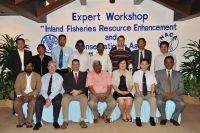Over the past few decades inland fisheries resources have come under increasing pressure from water engineering projects, pollution and overfishing. FAO and NACA convened an expert workshop to review inland fisheries resource enhancement and conservation practices in Pattaya, Thailand, 8-11 February. Experts from 10 Asian countries attended the meeting to share experiences and lessons learned. Regional collaborative efforts are required to facilitate assessment of current inland fisheries resource enhancement and conservation practices.
Inland aquatic ecosystems in China have been largely influenced by the large-scale economic activities and over-exploitation of aquatic resources. A wide range of fisheries resource enhancement and conservation activities have been carried out throughout China. This presentation reviews the history and practices and analyses the problems and insufficient in inland fisheries resource enhancement and conservation in China, and finally recommends some suggestions on technology and operation in order to sustain inland fisheries resources.
The beginning of inland fisheries resource stock enhancement in the Republic of Korea dates back to the early 1970’s, when fishing pressure was relatively low, and its development was closely related to the overall trends in the inland fisheries production. The release of hatchery reared juveniles of inland fisheries resources has become an increasingly common practice for stock enhancement and conservation over the last three decades.
Myanmar's inland water resources are still largely in a pristine condition. Fish, consumed in fresh and many processed forms is an important component of the protein intake of the population; consumption is estimated at 43 kg capita per year in 2008-2009. Stock enhancement of inland waters in Myanmar has been conducted since 1967, initiated through a seed replenishing program to the natural water, such rivers, lake, dams even rice fields.
The ecological and biophysical diversity existing in Nepal offers comparative advantages and opportunities to develop and restore inland fishery resources for livelihood enhancement and poverty alleviation of rural communities. Through good governance and proper legislative measures it is required to establish improved environmental protection. Efforts need to target beneficiaries such as disadvantaged and marginalized ethnic communities with training and awareness raising, appropriate legal instruments and infrastructure development needs proper mitigation in hydropower generation/irrigation projects.
